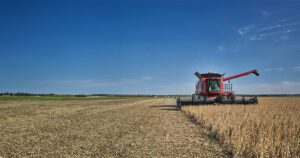By Scott Fenwick, Technical Director, Clean Fuels Alliance America
Published in Missouri Soy Magazine’s December 2023 Issue
If you’ve ever tried to start your diesel engine when temperatures are well below freezing, you’ve likely experienced the chilling sound of silence as your key turns in the ignition. This is a common scenario in the Midwest, where frigid mornings can catch even the most seasoned heavy-duty machinery operators off guard.
Whether using petroleum diesel or biodiesel, cold flow operability is one of the key challenges all diesel fuels face, especially in colder climates. While these challenges may deter you from exploring low-carbon diesel fuel alternatives like biodiesel, there are several proven solutions that allow these cleaner fuels to be used successfully as the seasons change.
Understanding cold flow operability can help biodiesel users properly maintain their equipment year-round. Cold Flow Operability refers to the ability of a fuel to flow and perform adequately in low-temperature conditions. All diesel fuels, including biodiesel, can freeze or gel as the temperature drops. If this happens, it can lead to various operational issues, including clogged fuel filters, fuel system damage and reduced engine performance.
These challenges are regularly studied by institutions such as the National Renewable Energy Laboratory (NREL), and others, with support from Clean Fuels Alliance America, the national trade association that represents biodiesel, renewable diesel and sustainable aviation fuel. NREL’s latest edition of the Biodiesel Handling and Use Guide outlines key low-temperature performance metrics including:
Cloud Point: Fuels contain waxes and other materials that can crystallize and separate from the fuel at low temperatures. A fuel’s cloud point is the highest temperature at which wax begins to form and small solid crystals can first be observed, giving the fuel a cloudy appearance. This is an important parameter of all diesel fuels since the presence of solidified waxes can clog filters and negatively impact engine performance. The cloud point is the most conservative measurement, down to which all fuels should still provide the expected performance.
Cold Filter Plugging Point: This measurement of fuel operability is a critical property used to measure the lowest temperature at which diesel fuel will freely flow through a standardized filtration device when cooled under certain conditions and has been correlated to light-duty engine performance. Winter operability of diesel fuel, including biodiesel, is often benchmarked by cold filter plugging point testing.
Pour Point: The pour point is the lowest temperature at which fuels can be poured or pumped. Fuels with a higher pour point may contain so many agglomerated crystals, that the fuel may not flow adequately, making it unsuitable for cold weather use. The pour point is an important indicator for distributors to determine if the fuel can be pumped, especially if temperatures are unsuitable for diesel engines.
The technical team at Clean Fuels understands the importance of cold flow operability and its challenges. Their collaboration with NREL highlights solutions that are being developed to ensure a sustainable and smooth transition for using biodiesel in the winter months. To address the challenges associated with cold flow operability, various strategies can be implemented:
Storage and Handling: In order to achieve optimal performance, it is important to protect the fuel in diesel engines from the cold by storing vehicles or equipment in an enclosed area such as a barn or garage during the winter months. If equipment, and the fuel, must be stored outside, all attempts should be made to keep the fuel clean and dry. This will help keep the fuel tank warm and improve startup. This is often why fuel terminals and retail stations store their fuel in underground storage tanks where temperatures are more constant.
Increased Blending with No. 1 Grade Diesel: One common approach is blending biodiesel with No. 1 grade diesel, which has better cold flow properties. By blending with increased volumes and percentages of No. 1 diesel, or kerosene, the finished fuel blend will achieve improved cold-weather performance while still promoting the use of renewable fuels.
Cold Flow Additives: Specialized fuel additives can be introduced to improve the cold flow properties of diesel fuels. These additives alter the properties of the fuel to prevent gelling and wax crystallization at low temperatures. Clariant, the leading provider of cold flow additives for middle-distillate fuels, is in the final development stages of an additive that will provide the same operability that you can expect from a winterized diesel fuel even for blends up to B50 (or 50% biodiesel). It is important to note that not all cold-flow fuel additives work equally as well in all fuels. Tests should be performed to find the additive that works best with your fuel and at the correct dosage.
Seasonal Blending: Some regions practice seasonal blending, adjusting the biodiesel blend ratio according to the temperature. For example, in Minnesota, the first state to adopt a biodiesel mandate, blends of 20% biodiesel are required in the summer months, while blends are reduced to 5% in the winter and early spring.
Overcoming challenges such as cold flow operability ensures that biodiesel remains a viable and effective alternative fuel source for decarbonizing the on- and off-road transportation sectors while supporting billions of dollars in economic activity for rural America. While there are no perfect fuels for every application and season, biodiesel blends and the contributions that today’s soybean farmers make are leading to advancements in engine technologies to help reduce carbon emissions and particulate matter (soot) that improve the health of nearby neighbors and neighborhoods.
ABOUT CLEAN FUELS ALLIANCE AMERICA
Made from an increasingly diverse mix of resources such as recycled cooking oil, soybean oil, and animal fats, the clean fuels industry is a proven, integral part of America’s clean energy future. Clean Fuels Alliance America is the U.S. trade association representing the entire biodiesel, renewable diesel and sustainable aviation fuel supply chain, including producers, feedstock suppliers and fuel distributors. Clean Fuels receives funding from a broad mix of private companies and associations, including the United Soybean Board and state checkoff organizations.





